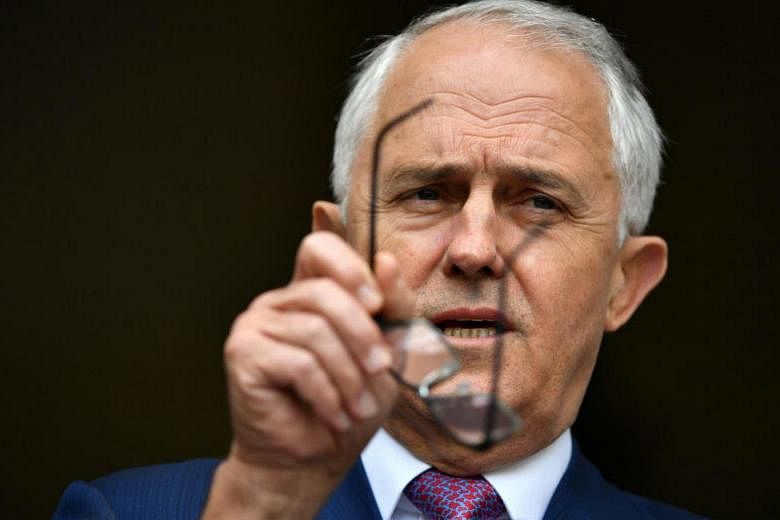SYDNEY - China insisted it has no plans to interfere in Australian domestic affairs after Canberra announced laws to curb espionage and ban foreign political donations following growing concerns about alleged meddling by Beijing.
Responding to Australia's new anti-interference laws, Chinese Foreign Ministry spokesman Geng Shuang said China "always" avoids interfering in the internal affairs of other countries with which it has friendly ties.
"We have no intention of interfering in Australia's internal affairs or exercising influence in its domestic politics through political donations," he told reporters.
The Chinese embassy in Canberra, in a separate statement on Wednesday (Dec 6), lashed out at accusations of Chinese interference.
"Some Australian media have repeatedly fabricated news stories about the so-called Chinese influence and infiltration in Australia," the English-language statement on its website said.
"Those reports, which were made up out of thin air and filled with cold war mentality and ideological bias, reflected a typical anti-China hysteria and paranoid (sic)."
Australian Prime Minister Malcolm Turnbull expressly referred to concerns about Chinese interference when he announced the laws in Canberra on Tuesday, though he insisted the laws were not aimed at a single country.
"Foreign powers are making unprecedented and increasingly sophisticated attempts to influence the political process, both here and abroad," Mr Turnbull said.
"We have recently seen disturbing reports about Chinese influence. I take those reports, as do my colleagues, very seriously."
Citing another example of outside interference, Mr Turnbull referred to "credible reports" about Russia's interference to try to assist Donald Trump in the 2016 United States Presidential election.
But the focus in recent months in Australia has been squarely on alleged attempts by China to interfere in Australian politics and universities.
In recent days, an audio recording emerged from last year in which a Labor Opposition party MP, Mr Sam Dastyari, promised to respect China's position on the territorial disputes in the South China Sea.
At the time, Mr Dastyari was addressing the Chinese community media and was standing next to property developer Huang Xiangmo, a billionaire who has made extensive donations to Labor and who has links to the Chinese Communist Party.
Mr Dastyari also reportedly visited Mr Huang at his Sydney mansion to warn him that his phone might be tapped by Australian intelligence agencies. The Labor MP insisted he was passing on gossip rather than official intelligence but was sacked from his Senate leadership positions by Labor leader Bill Shorten.
Mr Turnbull, who leads the ruling Coalition, seized on the scandal engulfing Mr Dastyari to push for the crackdown on foreign intervention.
"Senator Dastyari sold Australia out," Mr Turnbull said.
"China (does not) expect the Australian Government to… sell out Australia for a few thousand dollars."
The new laws, due to be introduced in Parliament this week, will require anyone lobbying politicians on behalf of a foreign power to register their interest. Former MPs and former senior public officials will be required to disclose when they are acting for a foreign party.
This change, based on a similar register in the United States, follows concerns about the growing number of former senior government figures who have quickly gone on to represent Chinese firms.
The new laws will also introduce harsher penalties for espionage and ensure that spying offences cover attempts to interfere with Australia's democracy.
The ban on donations will cover payments to political parties from foreign bank accounts, non-citizens and foreign entities. Most countries already have similar bans.
An Australian defence and security expert, Dr Ross Babbage, from the Center of Strategic and Budgetary Assessments in Washington, said the changes were overdue and were required to curb China's increased attempts to interfere in Australian politics.
"China has certainly been active essentially campaigning for political influence here," he told ABC Radio.
"It has been involved in a raft of indirect activities through a range of business people, some of whom are ethnic Chinese, some of whom are not."
Mr Turnbull made it clear that the new laws were not intended to target members of the Chinese-Australian community or other migrant groups.
"We are a nation where most of us come from migrant families… and our communities are part of the solution, not part of the problem," he said.


